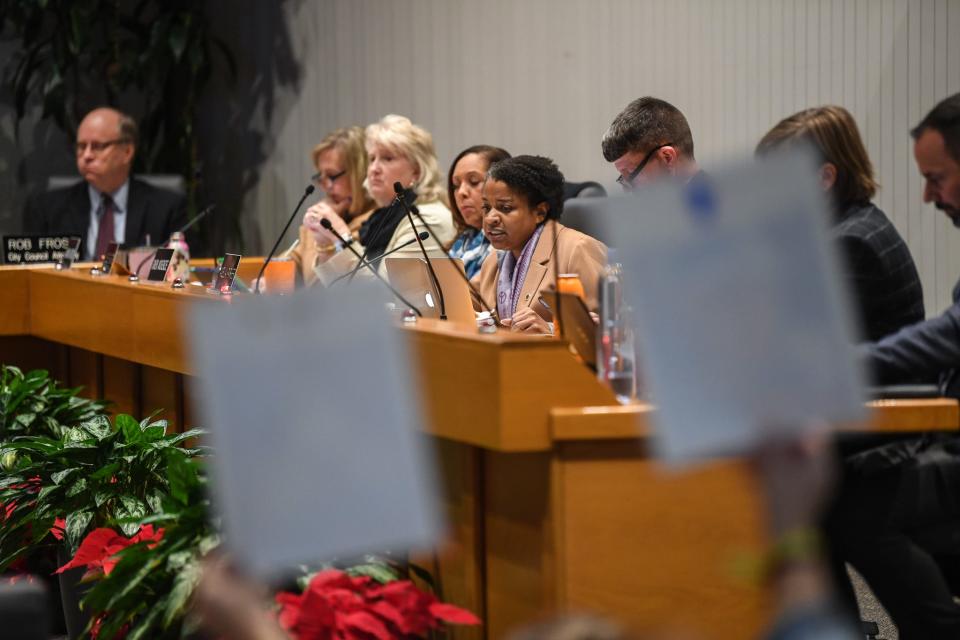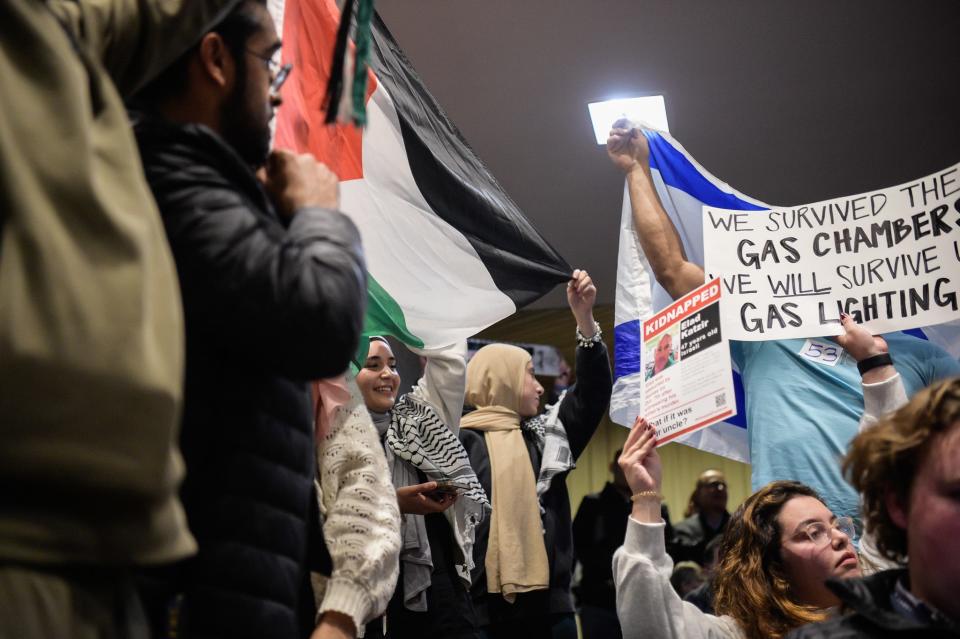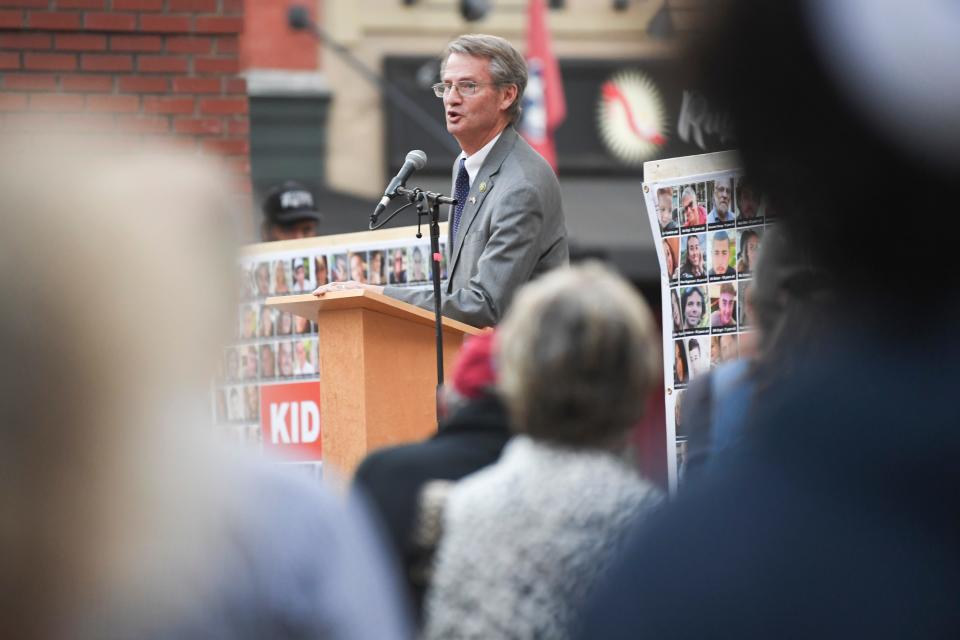Knoxville residents are angry over war in Israel and Gaza. What do they want at home?
- Oops!Something went wrong.Please try again later.
Through chants and shouts, through tears and cheers, Knoxville residents have made it clear where they stand on whether the city's government should declare its support of a ceasefire in the ongoing war between Israel and Hamas.
But what do they actually want to see change at home, some 6,000 miles away from the rockets and rubble?
Multiple rallies in Market Square, student demonstrations at the University of Tennessee at Knoxville and a couple fever-pitched city council meetings have all revealed the pain of the war that connects Israel, the Gaza Strip and Knoxville.
"We have upheld our First Amendment duties as a city," said a beleaguered Mayor Indya Kincannon after 40 minutes of raucous public comment on the ceasefire resolution before City Council on Nov. 28.
The resolution, introduced by Councilperson Amelia Parker, brought hundreds of people to the assembly room of the City County Building to petition a governing body with no power to halt the war. They expressed grief and anger for the 1,200 civilians killed in Israel during the Oct. 7 attack by Hamas militants and about 15,000 civilians in Gaza killed by the Israeli military so far in the retaliation.
No councilmembers seconded Parker's motion to vote on her dead-on-arrival resolution, which she said would join a chorus of similar calls from international human rights organizations. Days after the meeting, Parker told Knox News she still wants the city to call for an end to Israel's bombardment of Gaza, which the United Nations called a potential "genocidal incitement."
The word "genocide" has become a flashpoint in discussions about the war as supporters of Israel argue the killing of Jewish Israelis by Hamas, and not Israel's wartime retaliation, was genocidal.
"The resolution I introduced was an opportunity for the city council to state unequivocally that Knoxville stands against genocide," Parker said in a statement to Knox News on Dec. 1. "Rather than take a side between Israel and Hamas, Knoxville would stand with the Palestinians facing a genocide and all innocent victims of this ongoing conflict."
As much as Parker seeks to tread a narrow path, the crowd at the city council meeting was not ready to find a common understanding.
Residents showed up as a fragile truce in the war, since ended, entered its fifth day and Israeli hostages were being released daily by Hamas. Some know hostages and some have family in Gaza, which raised the emotional temperature of the room.
They lingered after the meeting to debate the nature of God's Old Testament promise that his people would have a land of their own. They shouted that the meek would inherit the earth, but disagreed over who the meek are.
But had they come out to do more than share their perspective?

Palestinians in Knoxville want message of support
The city council limits public speakers to six for each resolution, three in opposition and three in favor, though 80 people signed up to speak on the ceasefire resolution.
Supporters of the measure took particular aim at the mayor, who, like President Joe Biden, has become a lightning rod because of strong and vocal support of Israel.
The political calculus of declaring support for Israel days after it suffered a surprise terrorist attack was simple. It has become much more complex after Israel's killing of civilians in Gaza created what the United Nations chief called an "epic humanitarian disaster."
One day after the Oct. 7 attack, Kincannon posted on social media that "Knoxville stands with the people of Israel and their right to defend themselves." She referenced a trip she took to Israel with the American Jewish Committee earlier this year. One of the Israeli mayors she met on her visit was killed by Hamas in the attack.
Both her trip to Israel in March and her appearance at an Oct. 15 vigil hosted by the Knoxville Jewish Alliance, where she said Knoxville stood with Israel, caused anger in Palestinian residents and their supporters, who felt the mayor was overlooking the deaths of Palestinians.
On Oct. 24, Kincannon said in a post that she had met with Palestinian community members and grieved "the loss of innocent lives in Gaza and Israel."
Hasan Atatrah, a Palestinian organizer and UT student, told Knox News the statement was insufficient, and that the city should cut any ties to the Israeli government.
Atatrah and others argued before councilmembers that passing a ceasefire resolution would be a clear message of support for their Palestinian constituents. He was one of many college students dressed in black who had come to support the resolution.

He said the majority of UT students he has spoken with have expressed sympathy for Palestinians and support for a ceasefire.
It was impossible to ignore the younger average age of those chanting "From the river to the sea, Palestine will be free" at the council meeting. A relatively older group opposed the ceasefire on the grounds it would only encourage Hamas, widely considered a terrorist organization with genocidal aspirations against Jews and little interest in the lives of Gazans.
An NPR/PBS NewsHour/Marist poll from October found that just 48% of Gen Z and millennial Americans think the U.S. should publicly support Israel in the war, compared to 63% of Gen X, 83% of baby boomers and 86% of the Silent generation.
"From what I've seen, there is a massive cultural shift happening, especially in young people in the Christian community," Atatrah said. "I think the facts on the ground right now are too overwhelming for people to deny."
Atatrah said he wanted city leaders to mention the climbing death toll in Gaza whenever they mentioned the death toll in Israel and that he hoped the city would commit to protecting protestors calling for a ceasefire.
Jewish residents of Knoxville who stated support for a ceasefire at the city council meeting had their identity questioned by Jewish opponents.
"I believe that my Jewish heritage increases my responsibility to speak out against the killing of thousands of civilians by Israel," Julie Elfin, a spokesperson for the Knoxville chapter of Jewish Voice for Peace, told Knox News. "Acknowledging Israel is capable of wrongdoing, like any other nation, and does not represent all Jews, actually counters antisemitism in the United States."
Jewish Voice for Peace, an anti-Zionist leftist group that advocates for boycotts of Israel, called on Kincannon and the Knoxville Police Department to refuse to enter into any contracts or trainings with the state of Israel and to renounce what Elfin called "undue surveillance" of Palestinians and their supporters.
The city has not entered into any training program in Israel for its police, such as a controversial program offered by the Anti-Defamation League. There have been no official reports of surveillance, though pro-Palestinian protestors shared accounts of what they said was unsolicited police presence at their events.
Some who came to support a ceasefire acknowledged the war was far from Knoxville, but argued the resolution would still have been meaningful.
Recent polling from multiple sources show that while U.S. support for Israel is stronger than support for Palestinians, that support is slipping and a majority of Americans, 68% according to a Reuters/Ipsos poll, support a ceasefire.
"I know many of you are asking, what does this have to do with the city of Knoxville?" Maha Ayesh, a Palestinian attorney and lifelong Knoxville resident, said. "Here in Knoxville, as some have mentioned, several families have lost dozens of their family members. We want to know that you do care about our lives."
Ayesh said Knoxville should join a growing list of American cities that have passed ceasefire resolutions, including Atlanta; Oakland, California; and Providence, Rhode Island. Detroit, home to a significant Muslim population, became the largest U.S. city to support a ceasefire on Nov. 21, with a 7-2 vote from its city council.
Opinions about the war vary drastically along political lines, with 71% of Republicans and only 36% of Democrats saying they support Israel's military actions in Gaza, according to a Gallup poll conducted Nov. 1-21.
For Humpty Sharma, a UT alumnus and human resources professional who came to the council meeting to support a ceasefire, the fact that so many people showed up to call for change was a sign of another change needed in Knoxville: more politically engaged voters.
“It’s very disheartening to see that the people on campus right now are still worried too much about Vol Football and that multimillion dollar program than, you know, innocent men, women and children being murdered," Sharma said.
Of the more than 15,000 civilians killed in Gaza by Israel, a figure released by the Hamas-run Gazan Health Ministry, more than 6,000 were children.
Jewish community leaders bemoan ceasefire resolution
Those who came to oppose the failed ceasefire resolution are not convinced it was a productive means of supporting Knoxville residents.
"The only outcome of what we just experienced is more division in our city," Bryan Goldberg, president of the Knoxville Jewish Alliance, told Knox News after the meeting. "One side feels like they lost, the other one feels like they won, meanwhile, all it does is create animosity between two communities in Knoxville when there really shouldn’t be any."
The Knoxville Jewish Alliance, which oversees the Arnstein Jewish Community Center, has a community relations committee that connects with other minority groups to promote civil rights. Goldberg said the committee's work had become even more important during the war, providing opportunities for shared grief.
“At the end of the day, I don’t think that there’s a lot of sunshine and easy roads in front of the Knoxville Jewish community, but if we as a community continue outreach efforts to other minority communities and just meet human-to-human, then we can build those bridges," Goldberg said.
Marc Forman, chair of the alliance's Israel committee, said he was generally pleased with how the city and UT have handled antisemitism where it has arisen since Oct. 7.
In late October, KPD responded to reports of antisemitic flyers distributed in West Knox County. UT said a professor "fell short" of its standards by making comments it considered antisemitic in a statement on Nov. 1. It declined to name the professor or describe the situation, saying it had been handled internally.
A former public school educator, Forman's concerns lie with what he believes to be a flawed education system and a need for public communication from non-Jewish residents. He was glad to be in D.C. marching with 290,000 other supporters of Israel when protestors in Knoxville first called Nov. 14 for a local ceasefire resolution.
“I'm not hiding the fact that I'm Jewish. I refuse," Forman said. "If anything, I'm showing my Judaism more now than I did before.”
Downtown rallies reflect debates over US aid to Israel
Several downtown rallies in support either of Israel or Palestinians have brought Knoxville residents from across religious backgrounds together, including Jews, Christians and Muslims.
On Nov. 16, members of the Christian and Jewish communities of Knoxville gathered to call for Israeli hostages to be brought home. They set up a Sabbath feast table in Market Square with an empty chair for each of the roughly 240 hostages held at the time in Gaza. That number is now believed to be around 136 hostages, the Associated Press said in a recent report.
Elected officials, including Rep. Jason Zachary, R-Knoxville, and U.S. Rep. Tim Burchett, came to express full support of Israel in its counteroffensive.
Burchett, a staunch supporter of Israel, said he would not support any bill that linked military aid to Israel with aid to Ukraine, which is in its second year of a counteroffensive against Russia.
"I don't think we should tie what's going on in Ukraine to what's going on in Israel. It's two different situations," Burchett told Knox News. "Israel has been a loyal ally to us. We shouldn't tie that to anything."

The U.S. is the largest supporter of Israel's military and security infrastructure, and has given the country $130 billion since 1948. Supporters of the ceasefire resolution took issue with U.S. aid to Israel, which they said was directly supporting the killing of Gazan civilians.
Some cited the University of Tennessee as a solution and others as a problem. Knoxville's status as a college town has inflected discussions about the war. After Oct. 7, college campuses came under scrutiny when certain student groups blamed Israel for the murder of its citizens by Hamas.
Concerns for both antisemitism and Islamophobia has been focused on Ivy League schools and other elite private colleges clustered on the coasts. Public schools in conservative states like Tennessee have not seen the same kind of uproar.
Still, as opposing groups of Knoxville residents claim the other side is misinformed and undereducated, they have cited the power of UT to shape public opinion.
For professors who study Judaism, Islam or the Israeli-Palestinian conflict, conducting teach-ins or other public educational events feels secondary given the intensely personal and emotional nature of the war.
Helene Sinnreich, head of the religious studies department at UT and a scholar of modern Jewish history, said she and her colleagues are focused on supporting their students and avoiding the messiness inherent in discussing the war.
“I think there's been a little bit of a chilling effect because a lot of the teach-ins on other campuses have had such huge backlash from outside of campus,” Sinnreich said. “There was a consensus feeling that no one was specifically an expert in this area.”
In a sign of how intractable the conflict is, Sinnreich has used a textbook with mirrored pages. On one side is the history of the Israeli-Palestinian conflict told by an Israeli scholar and on the other side is the same story told by a Palestinian scholar.
Some faculty have hosted lectures or teach-ins and student groups, like Students for Justice in Palestine, have hosted events of their own and hung flyers around campus.
They have demonstrated that an international issue touches the lives of Knoxville residents deeply. Still, the Muslim and Jewish student populations are small minorities at UT. Though the university is the state's largest employer of Jewish people, only 300 of its more than 36,000 students are Jewish, according to Hillel International.
"Not that those are the only groups of people who are interested or invested in what's happening right now," Sinnreich said. "But I do think these small numbers do play a factor in what you're going to see happening on campus.”
Daniel Dassow is a growth and development reporter focused on technology and energy. Phone 423-637-0878. Email daniel.dassow@knoxnews.com.
Support strong local journalism by subscribing at knoxnews.com/subscribe.
This article originally appeared on Knoxville News Sentinel: Knoxville activists call for local change during Israel-Hamas war

